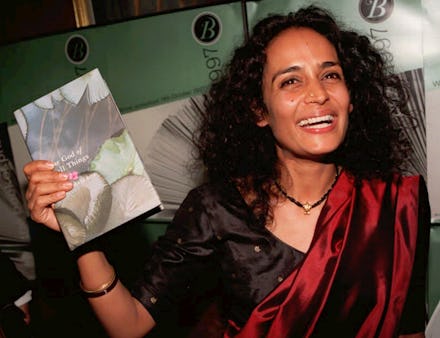'The God of Small Things' is the Book That Changed My Life

"May in Ayemenem is a hot, brooding month." Not since the opening of Lolita — that play of tongue against teeth, testing the sounds in a way at once childish and sexual — has a novel felt so clearly defined by its beginning. The God of Small Things could only exist in Ayemenem, Kerala, India; in a country "poised forever between the terror of war and the horror of peace;" in a heavily classist state where communism is finding its way; in a household of anglophiles whose family members are self-described as the casualties of colonization, that war of heritage and culture which, as one character puts it, has "made us adore our conquerors and despise ourselves."
The novel doesn't shun the country's colonial language, and it doesn't entirely accept it; instead, English is reinvented. Roy's writing revels in childish neologisms — in the combining of words, in their sound ("Their Prer NUN sea ayshun was perfect."), and in the way English confers status: "She felt she spoke much better English than everybody else. This made her lonelier than ever." It's the most compelling sort of post-colonial literature because it uses the colonial heritage — both its language and perspective — to condemn harmful customs (e.g. the branding of people, at birth, as Untouchable) at the same time that it is illustrative of the wreckage that the imperialists left behind, and unforgiving of anglophiles carrying on in the colonial tradition.
The story is coiled around two deaths revealed in the opening chapter of the novel, which then progresses in a non-linear fashion. It unravels the pall to bare up the ugly lump of back-story, like our rocky Earth denuded of its oceans. Roy exhibits the legacy of a dehumanizing caste system; the brutality of minor autocrats in their respective territories (law enforcement, a pickle factory, local politics, marriage); and two children coming to terms with a world completely inconsistent with their perception of fairness.
But ultimately, what was most striking about the book, reading it as a teenager, was the way it felt at the same time distinctly familiar yet undeniably foreign — it's a book that depicts a foreign country, a non-English speaking place, in English. This is vastly different from the world of translated literature (which I was reading in my high school classes) because the intended audience of Roy's novel is us: English speakers. It was the first book that took me beyond the tedium of young-adult imagination, in which the geographical or cultural heart of the story was always in the West. Narnia, Lyra's Oxford, Redwall, Wonderland, Hogwarts, The Chocolate Factory, even those books which often usher young readers from young-adult into 'literary' fiction — namely the dystopian worlds of Orwell, Huxley, and Burgess — are palpably Western.
What surprised me as I read The God of Small Things wasn't that the book was written in English and depicted the English-speaking world (as is perhaps expected), but rather my assumption of literature as somehow belonging exclusively to that world. The paradigm was Western and English. 'Literature' brought to mind a dusty, leather-bound thing that, for me, recalled Dickens and the English patois in which I imagined the narrator of Great Expectations introducing himself: "My father's family name being Pirrip, and my Christian name Philip, my infant tongue …," etc.
At this point, most informed high schoolers are shaking their heads at me: Didn't you read Márquez? Kafka? Yes, but: such works had been introduced as so spectacularly foreign (read: translated) that they occupied another sphere of fiction entirely: World Literature. (Think, for example, of the Best Foreign Language Film category at the Academy Awards, which cordons films from the majority of the world off in a field distinct from the general category of films.) Most unsettling was how all this — this inculcating and doctoring of assumptions, if you will — had been managed clandestinely, as if under the cover of sleep some malevolent figure had, as Roy's character Chacko explains it, "captured dreams and re-dreamed them."
Roy makes a metaphor of sleep conditioning, but you might remember it from Huxley's Brave New World. Similarly with the doctoring of language and its associations with Orwell's 1984. Actually, in some ways, The God of Small Things is issuing the same warnings that you might find in many a dystopian novel, only less explicitly. It's a book about rules ("They broke Love Laws. That lay down who should be loved. And how. And how much."), and being caught in the orbit of local norms and societal pressures — 'History' as Roy would term it.
It's when the characters break out of the loop, when order (in this case: caste) is undone, that the driving forces of plot manifest. Roy's novel works in the very true sense of a novel: the pressures come from within, not without as would have been the case in a heavy-handed author impressing her agenda on the page. As with dystopian books, The God of Small Things can teach us to think a little about the rules that govern our own quotidian scope and circuit: how we live by those laws, how we think about them, and what happens when we're confronted with something that takes us outside the sort of thinking to which we're accustomed.